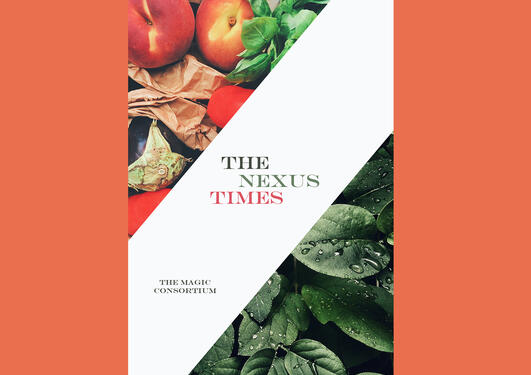Moving Towards Adaptive Governance in Complexity: Informing Nexus Security (MAGIC)
MAGIC var eit fireårig EU-finansiert prosjekt med temaet “Integrated approaches to food security, low-carbon energy, sustainable water management and climate change mitigation."

Hovedinnhold
Informasjon på engelsk under:
MAGIC takes a fresh look at the EU 2020 strategy’s aim for a smart, sustainable and inclusive growth set in the context of the existing recession, of the worrying signals of disaffection toward the European project and of science’s own governance crisis.
In the third millennium, the shift from an “empty world” to a “full and globalized world” is reaching its maximum speed and this generates new challenges for the governance of sustainability. Conventional solutions such as re-adjusting the mix of production factors – substituting a less limited resource to compensate for a shortage of another, or externalization of the problem to someone else by taking full advantage of presently favourable terms of trade, may become unsustainable in the long run. Implementing policies involving the Nexus between water, food, energy and land use calls for an urgent overhaul of the existing theoretic and analytic tool-kits.
The goal of MAGIC is to transform Nexus from a shorthand to signify the complexity of the relationship between water, soils energy and climate into a set of relationship over identified factors which can be systematically used to explore this complexity. This implies integrating into the analysis social challenges and stakeholders perceptions related to the climate-water-food-energy nexus.
A new paradigm which has its focus in the generation and testing of narratives will render mainstream new salient terms such as ‘Nexus-analysis’, ‘Nexus-security’ and ‘Nexus-consistency’. Dialogue spaces will be opened, dissemination strategies enacted and mixed qualitative-quantitative tools developed in the context of a community building exercise transcending mechanistic scientist-policy maker separation but taking full advantage of the rich spectrum of actors and institutions active in the Nexus.
Under the coordination of the Autonomous University of Barcelona, the MAGIC project will pursue the above-mentioned strategy with the following concrete objectives:
- Structuring the perception (qualitative) and representation (quantitative) of the nexus using an approach called Quantitative Story-Telling, i.e. the construction and the verification of the narratives used to study and assess the nexus.
- Carrying-out in the context of EU policies relevant to the Nexus: (i) a diagnosis of the state-of-the play – where are we now? ; (ii) a simulation of the options space – where could we go from here?
- To create and maintain a Nexus Dialogue Space considered as an essential infrastructure for the definition, operationalization and governance of the Nexus. A good example of what can be achieved by open consultation concerns the case of GMO.
- To create a Nexus Information Space (NIS). The NIS is a geo-referenced visualization tool embedding the complex information related to the Nexus. It makes it possible to establish a connection between the different metrics used to storage data about water, food, agriculture, energy or climate, among others.
- To carry out a quality check on policy narratives referring to the nexus. Quantitative Story-Telling uses the results expected by the chosen policy to check whether these results are feasible, viable and desirable in relation to the nexus.
- To carry out a quality check on the process of assessment of innovations referring to the nexus. Also in this case, the QST will be applied to check the feasibility, viability and desirability in relation to the nexus of a large scale application of innovations. Here different case studies will be used in relation to five innovations relevant for the nexus: (i) biofuel production, (ii) fracking, (iii) GMOs, (iv) tradable permits, and (v) desalination.
- To create a Nexus Knowledge Hub for enhancing the dissemination of the results and guaranteeing a long lasting legacy to the results of the project.
- Watch a series of short videos in the MAGIC project's Uncomfortable Knowledge series here.
- Listen to Roger Strand and Mario Giampietro talk about MAGIC in this podcast from Science for Policy by European Academies (SAPEA):


